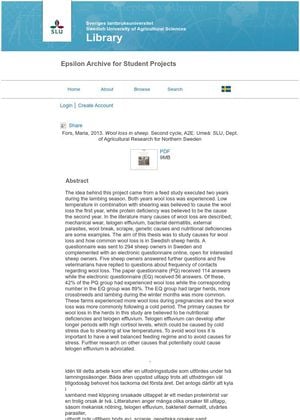Wool Loss in Sheep
July 2013

TLDR To prevent wool loss in sheep, provide balanced nutrition and reduce stress.
In 2013, Maria Fors conducted a study on wool loss in sheep, surveying 294 sheep owners in Sweden. The study found that 42% of the paper questionnaire respondents and 89% of the electronic questionnaire respondents had experienced wool loss in their herds. The electronic questionnaire group, which had larger herds and more crossbreeds, reported more wool loss during pregnancies and following cold periods. The primary causes of wool loss were identified as nutritional deficiencies and telogen effluvium, a condition that can develop after prolonged periods of high cortisol levels, potentially caused by cold stress due to shearing at low temperatures. The study concluded that to avoid wool loss, it is crucial to maintain a balanced feeding regime and minimize stressors. Further research was recommended to explore other potential causes of telogen effluvium.




